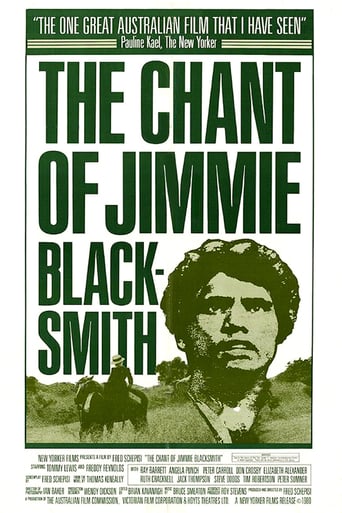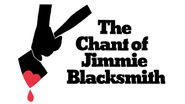Jackson Booth-Millard
I found this Australian film listed in the book 1001 Movies You Must See Before Die, like many of the others titles featured, I knew nothing about what to expect, but with good ratings I was looking forward to it, directed by Fred Schepisi (Roxanne, The Russia House, Six Degrees of Separation, Fierce Creatures). Basically set in early twentieth century Australia, Jimmie Blacksmith (Tommy Lewis) is a half-caste young man, child of an Aboriginal mother and a white father, raised by Reverand Neville (Jack Thompson) and his wife Martha (Julie Dawson). With a letter of recommendation from his foster family, Jimmie searches for work and hopes to establish himself, but he faces prejudice and people taking advantage, including his first employer Healey (Tim Robertson) while he is fence building, and his second employer, local constable Farrell (Ray Barrett). Jimmie finds some stability working for the Newby family on their farm, but they treat little better than previous employment, then he meets and marries white girlfriend Gilda Marshall (Angela Punch McGregor), who is already heavily pregnant, she gives birth to a white child, he is upset by the public embarrassment, but Jimmie embraces being a parent. Shortly after the birth, Jimmie's full-caste brother Mort (Freddy Reynolds) and uncle Tabidgi (Steve Dodd) come to the Newby property, Jimmie enlists them to help with fence building, but Mr. Newby uses their presence as an excuse not to provide Jimmie with provisions and pay, meanwhile Gilda refuses a teaching opportunity suggested by schoolteacher friend Petra Graf (Elizabeth Alexander). Furious by his family's mistreatment, Jimmie enlists Tabidgi to help him "scare" the Newby women, threatening them with hatchets, but this suddenly turns into a rampage that leaves Mrs. Newby, Miss Graf, and all the Newby daughters but one infant dead. Jimmy's family are forced to flee, Tabidgi, Gilda, and the child are left behind, while Jimmie and Mort continue to run, they next murder Healey, Jimmie announces he has declared war against all that have wronged him. Soon Jimmie's killings are covered by the press and becomes national news, a reporter questions the butcher, who also doubles as the city's hangman for the police, what may happen to Jimmie when he is caught, Tabidgi is captured and sentenced to death for accessory to murder, he tells that the killing was not part of the plan. Jimmie and Mort still uncaptured come upon schoolteacher McCready (Peter Carroll), they wound him by gunfire, he convinces them not to kill him, instead they take him hostage, the brothers argue about the morality of their crimes, specifically killing women and children, McCready mocks that white people have influence over the native Aboriginies. McCready convinces Jimmie to go alone, Mort takes the hostage to a farm to recover, there a hunting party led by the Neby males and Miss Graf's fiancée Dowie Steed (Peter Sumner) kill Mort. Jimmie meanwhile is shot in a lake, he is able to tend to his wounds and hide overnight, however he is found the next morning and arrested, they try to avoid the townspeople from beating him, in the end the last rights of Jimmie are read by Reverand Neville in his cell, the butcher/hangman observes them, despite his unique physical characteristics, he declares that Jimmie's hanging should go as normal as any other. Also starring Robyn Nevin as Mrs. McCready, Don Crosby as Jack Newby, Mrs. Heather Newby as Ruth Cracknell and Home and Away's Ray Meagher as Dud Edmonds. Lewis does give a compelling performance as the half-Aborigine on a war cry of ferocious rebellion, this film caused some controversy upon its release, not necessarily for its obscenity, but it was caught up in the video nasties panic, the murderous rampage is certainly the memorable material, it is slow at times, but all in all an interesting period drama. Good!
Tim Kidner
Fred Schepisi's 1978 film may well be just that but it's not included in my Australian Cinema 12 disc boxed set and I've never known it to be on TV, here. I became aware of it through my old film 'bible' Halliwells and they rated it very highly, awarding a rare maximum score, citing it as 'one of the greatest achievements in Australian cinema'.It's taken me a good number of years to finally find a copy that was on region of DVD I could play and wasn't a silly price.The first thing you notice is the sheer authenticity. Language is as brutal as any and is more akin to a Victorian Scorsese than starched collars and stiff upper lips. The language used to describe the aboriginal natives is as coarse and racist as you'll find in any gritty 70's set LA cop show and for that it is both upsetting and rather embarrassing, but at least goes to show the leaps and bounds humankind has largely made on this issue, since.Jimmie Blacksmith is a half-cast, a subject that has been visited in a few memorable films, particularly 'Rabbit Proof Fence' and as 'these' were often the result of rape against white women, were seen as worse than the lowest. Jimmie (superbly played by Tommy Lewis) does have an advantage, he's overseen by the local white vicar and is known as a hard and honest worker.He soon goes on to work for white farmers, along with his fully aboriginal brother, erecting fences. Miles of them. He does too good a job and they don't want to pay, so he moves on. His relationship with a white girl, then marriage results in a child, that by colour alone, cannot be his. Then, around half-way in, all this pent-up anger boiling up inside the civilised and decent Jimmie erupts. This is when the violence (extreme in its day, now, maybe sadly, average) erupts as he goes on a vengeful killing spree.I need not go further than this, except that obviously, he is then a wanted criminal and a fugitive on the run.There's a real sense of the epic, with cinematic hints and nods to Nicolas Roeg's 'Walkabout', with the natural geography, fauna and the culture all vividly brought to life, superbly filmed by Ian Baker .Thankfully - hopefully, this can now be seen as a historical drama, the like of which can never happen again. It is as hard-hitting and making as powerful a statement on in-bred racism there is and is without doubt a five star classic.
Sturgeon54
This is a fine example of the breed of excellent Australian films released in the 1970s during the Australian film renaissance (it's interesting to note that virtually all of the directors of these films, including director Fred Schepisi, later moved to the U.S. to make big budget Hollywood films). This tale of a young aboriginal man who eventually turns to violence following one humiliation after another by white settlers in 19th century Australia asks some very uncomfortable questions of the audience such as: Is it morally justified to use violence against a corrupt, racist, violent system in which there are no lawful means to receive justice? Additionally, it is up to interpretation whether the violent reactions of the title character are justified: we are clearly sympathetic to him in the beginning, but once he perpetuates incredible brutality on the settlers, can we remain sympathetic? He is definitely not a monster, but a well-mannered and educated Aboriginal brought up by missionaries. After all, his actions are not simply heat-of-the-moment reactions; he has formally "declared war" on the perpetuators of injustice. Does that legitimize what he is doing? The U.S. has been asking itself these exact same questions for the past 50 years: Jimmy is very much a close Australian cousin to Bigger Thomas, the main character in Richard Wright's classic American novel "Native Son" - a black man pushed to violence by virtually every aspect of white society.However, like Wright, I admired director Schepisi's decision to carefully straddle the line between whether Jimmy can be viewed as a simple societal construct or whether he is a man in control of his own actions. One could easily make a case for either of these scenarios or probably both of them. That makes the movie even more uncomfortable when one thinks about it afterward.In many ways, this is a very depressing movie; in the end there is no closure, no justice, and nobody has learned a damned thing, except possibly the audience, if they truly think about what they have just seen. I really respect filmmakers who tackle incredibly difficult subject matter such as this, with moral quagmires and complex characters. My only complaint is that it is very difficult to understand much of the Aussie English, so an American viewer must listen very closely. This is a film definitely deserving of a U.S. audience. Too bad that its controversial (i.e. thought-provoking) nature has probably prevented it from being released on VHS or DVD in the U.S. I understand copies of this are quite rare abroad, as well, so I suggest viewing it if given the opportunity.
ptb-8
This film from 1978 as directed by Fred Schipisi of SIX DEGREES fame and of Thomas Keneally's book - he wrote SCHINDLER'S LIST - is a grim and disturbing depiction set during colonial 19th century Australia of a young Aboriginal man's descent into frustrated violence against his white English landowner masters. It becomes a really brutal film with explicit axe murders, especially against young girls and older women, and it is this visually distressing depiction that ultimately alienated the cinema audience. Jimmy's humiliation and cruel treatment is equally explicit and it is a relentless string of unhappy experiences by his inhumane 'boss' that ultimately causes him to crack - and hack. As a novel it is all in the mind of the reader but as a cinemascope color film, the 'running amok with an axe' sequences make any crowd want to run from the cinema. It was not seen on TV in Australia for almost 20 years and it is not likely to be either without most of the violence cut out, thus blunting the heavy handed message and the ultimate impact. Like poor Jimmy himself, the film version is in no man's land either. Past all that, it is a well made film and with an excellent cast; but very tough going. It fits well into a series of very sharply observed Australian films depicting the British colonial mind and its misunderstanding or cruelty towards Aboriginies: JEDDA in 1956, WALKABOUT in 1970, this film in 1978, RABBIT PROOF FENCE in 2001 and THE TRACKER in 2003. Each and every one are unique and excellent in their story. This one however, is the most violent which does derail its message. White urban Australia run amok is hilarious in a 1966 comedy THEY'RE A WEIRD MOB or demented boozy antics in THE ADVENTURES OF BARRY MCKENZIE in 1972... and alarmingly, horrifyingly realistic, soaked in beer bullets fists and dead kangaroos blood in Ted Kotcheff's superb 1971 drama OUTBACK. See the lot! It is a head-shaking but enlightening string of films, especially if seen in chronological order....like we all did! (may explain why our film makers in the 90s made musicals)





